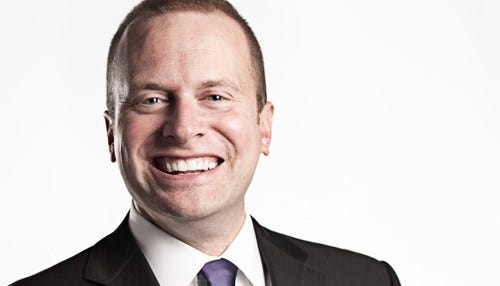Building a More Entrepreneurial Indy

Subscriber Benefit
As a subscriber you can listen to articles at work, in the car, or while you work out. Subscribe NowHoosier entrepreneurs have earned the spotlight this week for vast contributions to our economy: Indiana Entrepreneurship Week recognizes the new ideas, hard work and life-changing risks that have led to more than a million jobs across the state.
The Indianapolis business community is filled with start-ups and small businesses: One of every three local firms is less than five years old, and 90 percent of metro Indy companies have less than 50 employees – they generate more than 20 percent of our jobs. Roughly 65,000 business owners live and work in Indy, according to Kauffman Foundation calculations; our community’s job creators are also our neighbors, friends and family.
The future of our economy depends on helping them succeed and encouraging others to join them. Since 2000, the pipeline of significant business attraction projects (bringing at least 50 new jobs or $1 million in investment) has fallen by half nationally; we can’t recruit our way to prosperity with generous incentives or aggressive marketing. Homegrown business is responsible for up to 80 percent of regional employment growth.
As our metropolitan population passes two million, Indy has demographics on our side: Entrepreneurial activity is increasingly concentrated in the nation’s largest metro regions. More than half of all new businesses formation since 2010 has happened in the nation’s 20 biggest counties, dominated by cities like New York, LA, San Francisco, Chicago and Houston.
Urban areas are crowded with enterprising and inventive people, alongside large concentrations of potential customers – a perfect recipe for new businesses. Density of talent and intellectual capital also accelerates innovation: The Brookings Institution reports that the top 100 metros generate roughly 80 percent of all patents and R&D jobs, and more than 90 percent of all venture capital investment.
But Indianapolis can’t just count on our size for entrepreneurial momentum. We have to work at it, starting with the basics. The Indy Chamber provides free, one-on-one coaching to current and aspiring business owners, nearly 5,000 total hours to more than 1,500 Indy entrepreneurs in 2015. The Chamber also manages a multi-million dollar microloan program through our Business Ownership Initiative: We offer modest loans – typically in the $5,000-$100,000 range – to small-but-growing companies that may not fit traditional banking standards.
These programs are part of an expanding entrepreneurial ecosystem being built by the Indy Chamber and other partners. For start-ups in the life sciences and high-tech sectors, BioCrossroads and TechPoint provide industry-specific support and are responsible for roughly $150 million in venture capital raised and invested.
There’s also a well-publicized co-working movement across the region providing physical space, shared resources and a collaborative climate for young companies; DeveloperTown, Launch Fishers, zWORKS, the Bureau are among a growing list that reflects high demand from local entrepreneurs.
One of the most exciting entrepreneurial infrastructure projects is 16Tech, an innovation district just northwest of IUPUI that connects research capabilities on campus with R&D outposts from Eli Lilly & Company and other "advanced industry" giants headquartered in Indy. While 16Tech is made possible by major corporate investors, it includes ample incubator facilities to accelerate scientific and technological breakthroughs into new businesses.
It’s also notable that 16Tech will be a live/work community, with residential development alongside office and lab space, just outside the city’s fast-growing urban core.
Large cities are entrepreneurial hot spots because energetic, ambitious people want to be close to the action. Entrepreneurs want to do business in dynamic areas that appeal to the talented people they need to turn their ideas into reality. Growing communities also create opportunities for small businesses, whether serving a thriving neighborhood or getting connected to expand.
The geography of economic success suggests a symbiotic relationship between quality of life and new business. As more people choose Indianapolis as a place to live, more entrepreneurs will choose the city. This reinforces the urgency of improving mass transit to connect people and employers, promote neighborhood redevelopment and attract new talent – by making Indianapolis more livable, we’ll build a better entrepreneurial climate, too. (This isn’t a speculative connection. A recent analysis by the Martin Prosperity Institute finds the majority of U.S. start-up activity happening in urban neighborhoods served by mass transit.)
To create more cause for celebration during future Entrepreneurship Weeks, policymakers and civic leaders must simultaneously think smaller and bigger: Smaller, by focusing on the specific, practical resources that help entrepreneurs and local employers turn potential into profits. And bigger, with quality of life investments like transit that create places where entrepreneurs, their employees and customers want to live and work. That’s the formula for a more entrepreneurial Indianapolis.
Michael Huber is chief executive officer of the Indy Chamber.
